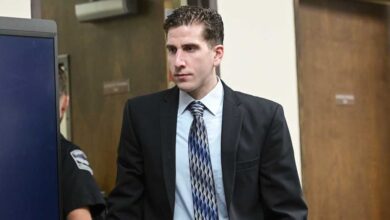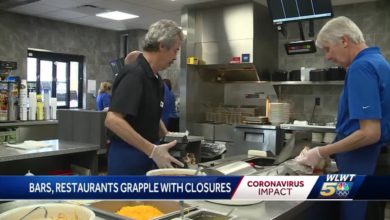WASHINGTON – President Joe Biden called for the U.S. to "come to terms" with the darkest moments of its history Tuesday during a trip to Tulsa, Oklahoma 100 years after a white mob burned the city's "Black Wall Street" to the ground, killing hundreds of Black Americans and forcing thousands from their homes.
Biden brought a national spotlight to the Tulsa Race Massacre, long neglected and glossed over in history books, becoming the first president to visit Tulsa on an anniversary of the bloodiest race massacre in U.S. history.
“I come here to help fill the silence. Because in silence, wounds deepen," Biden said.
In a speech that bluntly talked about racism in America, Biden made a "through-line" from the massacre of Tulsa 100 years later to a 2017 weekend in Charlottesville, Virginiawhich saw a white nationalist rally with tiki torches and racist chants. He discussed Republican-led efforts in state legislatures to curb voting rights, declaring the right to vote "is under assault with incredible intensity like I’ve never seen."
Biden arrived in Tulsa in the afternoon, touring the Greenwood Cultural Center and meeting with the three remaining survivors of the massacre, Viola Fletcher, Hughes Van Ellis and Lessie Benningfield Randle, each between 101 and 107 years old.
"You are the three known remaining survivors seen in the mirror dimly. But no longer.," Biden said. "Now your story will be known in full view. The events we speak of today took place 100 years ago, and yet I'm the first president in 100 years ever to come to Tulsa."
"Hell was unleashed. Literal hell was unleashed," Biden said, noting how private planes dropped explosives on the Black neighborhood of Greenwood. He said victims of the massacre were unable to get reimbursed for their losses through insurance and that no one was prosecuted for taking part in the mob.
"My fellow Americans, this was not a riot," he said. "This was a massacre. Among the worst in our history but not the only one. And for too long, forgotten by our history. As soon as it happened, there was a clear effort to erase it from our memory, our collective memory."
Biden announced a slate of policies meant to promote racial equity ahead of the trip. That includes a new inter-agency effort meant to combat housing discrimination, as well as new directives that will increase federal contracting with small, minority-owned businesses by $100 billion over the next five years.
In a proclamation issued Monday, Biden called on Americans "to commemorate the tremendous loss of life and security that occurred over those 2 days in 1921, to celebrate the bravery and resilience of those who survived and sought to rebuild their lives again, and commit together to eradicate systemic racism and help to rebuild communities and lives that have been destroyed by it."
The 1921 massacre saw white people rampage through a part of town known as Black Wall Street, killing hundreds of black people and destroying homes, businesses and other personal property. The massacre largely went forgotten despite the extent of the violence, death and destruction visited upon Black citizens.

Presidential priorities
For a century, the Tulsa race massacre of May 31, 1921, went largely ignored by sitting U.S. presidents, never prompting a trip specifically to honor those killed in the once-thriving Black neighborhood of Greenwood until now.
Immediately after the massacre, President Warren G. Harding said he was “shocked” and hoped that “such a spectacle would never again be witnessed in this country," a plea the federal government did little to ensure. Subsequent incidents of racist violence continued for decades after the wholesale killings in Tulsa.
More:100 years after the Tulsa Massacre, entrepreneurs revive spirit of 'Black Wall Street'
Former President Donald Trump visited Tulsa last June for his first campaign rally amid the coronavirus pandemic. He faced criticism for initially scheduling it on Juneteenth, the holiday celebrating the emancipation of enslaved people in the United States. But Trump did not reference the massacre in his remarks, which made headlines instead for saying he wanted to slow down testing for the COVID-19 virus.
More:TikTok teens credited with lowering Trump's Tulsa turnout
"This is very, very significant that the president of the United States is coming here," said Scott Ellsworth, a professor at the University of Michigan and author of "Death in a Promised Land: The Tulsa Race Riot of 1921," a comprehensive history of the massacre. "Everyone I’ve spoken to in the community has supported this."
A commander-in-chief acknowledging "the worst single incident of racial violence in American history," according to Ellsworth, is significant for the focus Biden's visit will put on the centennial and broader efforts to grapple with the nation's past failings on racial equality.
"The Black citizens of Tulsa were let down by their city government, by their state government but they were also let down by the federal government in this massacre," Ellsworth said.
"There was never any sort of federal investigation despite the fact that over 1,000 Black homes and businesses were burned to the ground and more than 10,000 people were made homeless. The federal government never stepped in and tried to figure out what happened."
US racism part of past and present for Biden
At roughly 100 days in, 89% of Black Americans said they approved of the job Biden was doing as president — more than any other racial group — according to a Pew Research Center poll. However, the administration's ongoing responses, particularly regarding economic inequality and criminal justice will be closely watched. The George Floyd Justice in Policing Act, which many had touted would pass by the anniversary of Floyd's death May 25, remains with the Senate.
The National Association for the Advancement of Colored People criticized Biden for not including measures to combat student loan debt facing Black Americans among his new steps aimed at racial equity
"You cannot begin to address the racial wealth gap without addressing the student loan debt crisis," NAACP National President Derrick Johnson said in a statement. "You just can't address one without the other. Plain and simple. President Biden's budget fails to address the student debt crisis.”
The administration also touted several of its proposals in Biden's infrastructure and jobs package, which officials contend will deliver economic opportunities for people of color.
The proposals include a $10 billion initiative targeting community revitalization efforts, projects retrofitting transit systems to redress the dislocation of minority communities, incentives to end exclusionary zoning and a new tax credit to develop low and affordable housing.
At the start of his presidency, Biden identified racial justice as one of the four crises of his presidency. Since taking office, the White House has sought to make racial equity a cornerstone of its policymaking.
The $1.9 trillion coronavirus stimulus package, for instance, included $5 billion in funding for Black farmers. The administration also changed policies at the Small Business Administration that prioritized loans through the Paycheck Protection Program to firms with fewer than 20 employees as part of an effort to target minority firms.
On his first day in office, Biden also signed an executive order meant to advance racial justice and equity within the federal workforce.
The White House has been criticized by some racial justice advocates for not going far enough in advancing some police reform and other progressive measures, though activists have conceded Biden officials are more responsive than past administrations on the issue.
Lives lost, as well as decades of Black wealth
The massacre erased decades of Black wealth accumulated in Tulsa and hamstrung wealth creation going forward. Various estimates determine the amount of wealth lost to be over $200 million in value adjusted for 2021.
"In terms of poverty, unemployment, infant mortality, all of those statistics, the city is still haunted by that massacre. And the tragedy created an economic trough that Black Americans have still yet to get out of," Ellsworth said.
The Black educator Booker T. Washington coined the name "Black Wall Street" for Greenwood in recognition of thriving Black middle, upper and professional classes with Black-owned businesses dotting the streets.
The neighborhood sprouted after O.W. Gurley, a wealthy Black landowner, in 1906 bought 40 acres of property in Tulsa and named it after the Mississippi city Greenwood. He started a boarding house for African Americans, ensured land was sold only to Black people and provided loans for new business ventures.
The massacre erupted over Memorial Day weekend of 1921 when a Black shoe shiner, Dick Rowland, 19, was falsely accused of attempting to rape Sarah Page, 17, who was white. Fearing Rowland would be lynched, about 75 armed Black men converged on the courthouse to guard him. They were confronted by about 1,500 white people.
Although the Black men retreated to Greenwood, the white mob followed, looting and burning homes and businesses and shooting Black residents at random. About 300 people died, and the attack destroyed millions in personal wealth, including savings that were kept in homes by residents who mistrusted white-owned banks. Thousands of Black people were left homeless.
'I have lived through the massacre every day'
The three living survivors testified this month before a House Judiciary subcommittee. Among them, Viola Fletcher, 107, told lawmakers, "I will never forget the violence of the white mob when we left our house."
“I still see Black men being shot, Black bodies lying in the street. I still smell smoke and see fire. I still see Black businesses being burned. I still hear airplanes flying overhead. I hear the screams. I have lived through the massacre every day."

More:107 years old and asking Congress for justice: Tulsa race massacre survivors testify
House Democrats have promised to introduce legislation that would allow victims to pursue a path to seek damages for the death and destruction that occurred on May 31 and June 1 of 1921. Similar legislation was proposed but never approved in 2007.
Fletcher told the subcommittee members they have “the power to lead us down a better path.”
“Open the courtroom doors to us,” she said.
Although former President Barack Obama did not commemorate the massacre in Tulsa, he recognized Olivia Hooker, one of the survivors, in 2015 as part of his commencement address to the Coast Guard Academy. Hooker, the first African American woman to serve in the Coast Guard, died in 2018 at 103 years old.
Contributing: Carmen Forman and Chris Casteel of the Oklahoman.
Reach Joey Garrison on Twitter @joeygarrison. Follow Matthew Brown online @mrbrownsir.









